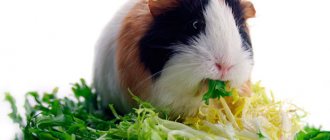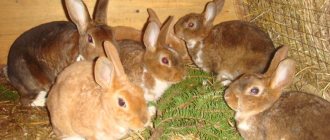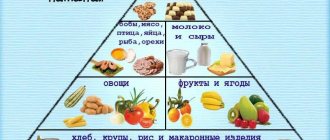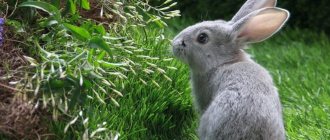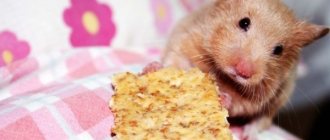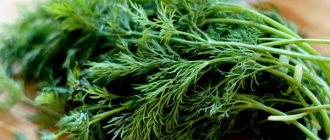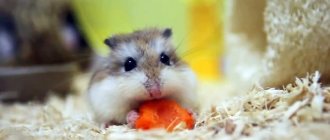Even experienced livestock breeders ask questions: what to feed their pet, whether it is possible to give certain products. Before getting a guinea pig, you should find out which foods will benefit the animal and which may harm its health. A guinea pig's daily menu should include vegetables, fruits, berries and cereals. Many vegetables and fruits can even be offered to your pet along with the peel. It is important to remember that not all foods that guinea pigs eat are equally beneficial for them. What rodents can eat and what they cannot feed a guinea pig is discussed in this article.
Vegetables
Can guinea pigs have radishes?
It is permissible to use only radish tops. The root vegetable contains essential oils that can cause irritation to the mucous membranes and respiratory tract of the animal. The vegetable also causes bloating. Therefore, it is not recommended to give radishes to pigs.
Can guinea pigs eat celery?
Celery can be given in any form - stems, leaves, roots. This vegetable is included in many dry food for rodents. Celery is enriched with vitamins B, PP, E, C, A and contains phosphorus, zinc, potassium, calcium, iron and magnesium. Before eating, celery must be washed thoroughly, especially the root.
Can guinea pigs eat tomatoes?
Ripe fruits can be included in the food. Tomatoes are well absorbed by animals and contain vitamin C and carotene, which are beneficial for their body. Green tomatoes contain solanine, which can negatively affect your pet’s health.
Too many tomatoes in an animal's menu can cause loose stools.
Can guinea pigs eat cabbage?
Cabbage can be included in the animal's diet. Cabbage contains many vitamins and other substances necessary for pigs:
- ascorbic acid;
- B vitamins;
- vitamins of the PP group;
- folic acid;
- sulfur;
- calcium;
- potassium;
- phosphorus;
- amino acids;
- microelements.
Today we have cabbage lunch.
The vegetable is able to keep the animal’s fur in excellent condition and strengthen its immunity. The top dried leaves should be given. It is preferable to feed guinea pigs Chinese cabbage and broccoli. White cabbage can cause bloating.
Can guinea pigs eat potatoes?
Green and sprouted potatoes are contraindicated for guinea pigs. Raw vegetables can be given occasionally, cut into small pieces. Boiled potatoes can be offered to your pet separately or added to grains and other foods.
The vegetable contains solanine, which can harm the health of the animal if the pet eats too many potatoes. The pig will become passive and catch cold quickly.
Can guinea pigs eat beets?
Beetroot contains many substances useful for animals: vitamins C, A and B, potassium, magnesium, phosphorus, iron. In excess, the vegetable contains fiber, so it acts on the animal’s body as a laxative. Store-bought root vegetables may contain nitrates, which are very harmful to the small body of guinea pigs. It is better to offer your pet homemade crops. The composition also contains a large amount of oxalic acid, so it is better to limit the consumption of this product.
It is recommended to give beets starting from 2 months; they are especially useful in winter and spring, when there are no fresh vegetables. The daily dose should not exceed 200 g, and it is better to exclude beets from the diet of pregnant and lactating pigs so as not to provoke an upset stomach. Beets turn stool and urine red, so if your animal has eaten them, don’t be alarmed by such changes.
Can guinea pigs eat pumpkin?
Pigs can be given all varieties of pumpkin that humans eat. For the digestion of herbivorous animals, such a product will be familiar and useful. Pumpkin contains vitamin C, calcium and phosphorus necessary for rodents. It should be borne in mind that this low-calorie vegetable will not be able to saturate the pig completely, so it is better to give pumpkin to guinea pigs as a treat.
Can guinea pigs eat bell pepper?
Another storehouse of ascorbic acid is bell pepper. Before use, the vegetable must be thoroughly washed and chopped, and the seeds removed. It is better to give the product together with dry food.
Green peppers containing solanine should not be given to animals, as should peppers in the form of hot seasonings. Spicy foods will damage the mucous membranes.
Can guinea pigs eat cucumber?
Cucumbers don't have as many nutrients as other vegetables. You can offer your pet a cucumber. The vegetable can harm your pet's health by causing digestive problems only if consumed in large quantities.
Can guinea pigs eat zucchini?
Zucchini is suitable for the diet of guinea pigs. They contain small amounts of vitamin C, calcium and phosphorus. It is better to prefer young vegetables; they can be given along with the peel, cut into crowbars.
Specific nutritional features
When purchasing food for your pet, you need to pay attention to the quality level of the elements contained in it. To do this, you must know exactly the answers to questions such as whether this or that food has a good taste and color, whether it contains harmful elements, etc.
New food must be introduced into the rodent's diet in parts, starting with small portions. During the addition, it is worth looking at the condition of the guinea pig.
If your pet often overeats, this will lead to acute disorders of the digestive system. The process carries with it dangerous and long-lasting consequences, obesity and a number of related diseases. There is no need to feed the animal every hour, when it first squeaks or rises on its hind legs. This behavior may indicate that he has nothing to do. Sometimes, it is quite enough to just play with the animal or allow it to run around a wider area.
Experts in breeding guinea pigs recommend eating wheat bran, oats, carrots, beets, good hay as the best food; in the summer, replacing root vegetables and hay with freshly cut grass. The bran must be soaked in water or boiled milk.
Fruits and berries
Bananas
Can guinea pigs have bananas? A banana rich in potassium will benefit your guinea pig, but you should not give more than 1 piece per day.
The peel of the vegetable must be removed, as it is treated with substances hazardous to health (wax, chemicals, ethylene and pesticides). For safety, it is better to remove soft fibers from the fruit.
I'm eating a banana! Om-Nom-nom. I won't give it to you!
Can guinea pigs eat a pear?
Pears can be given with the peel, but without the seeds. The fruit is washed well and cut into pieces; the pig should be offered water along with it. Excessive consumption of pears due to their high sugar content can cause diarrhea.
Can guinea pigs eat kiwi?
Kiwi is a very healthy fruit for animals. It contains a large amount of ascorbic and folic acids. It is also rich in vitamins E, iron, calcium, magnesium and phosphorus.
Kiwi is given without skin in the form of small pieces. For your pet, you need to choose harder fruits. It is better to control the amount you eat. An increase in the dose of kiwi is permissible in autumn and winter, as well as when feeding females during pregnancy and lactation.
Can guinea pigs have oranges and other citrus fruits?
Can be used occasionally. But it is better for guinea pigs to get vitamin C from other foods, avoiding citrus fruits. Possible complications:
- oversaturation with vitamins;
- skin irritation;
- oxidation of urine.
Can guinea pigs eat apples?
Apples can be raw or dried. They have a balanced ratio of sugar and fructose (18:80%). It allows the pig to be active.
The fruit must be peeled and cut into slices. It is better not to give more than 3 pieces at a time.
Can guinea pigs eat strawberries, grapes and other berries?
Strawberries contain a sufficient amount of vitamin C to pay attention to the berry when choosing a treat for a rodent. You can also give strawberry leaves to animals.
- The pig might like grapes. You can offer the animal seedless grapes.
- Eating currants once a week will also not harm your pet.
- If you do not abuse it, you can offer the pig berries and raspberry leaves, berries, leaves and branches of blueberries, blackberries and sea buckthorn, and rose hips without seeds.
- Cranberries are given for medicinal purposes. It has an anti-inflammatory effect on the mucous membranes of the mouth, stomach, and bladder.
Meal order
As a rule, adult rodents of this family are fed up to 3 times a day. One meal contains up to 2 tablespoons of combined food. When feeding 2 times a day, you need to pour 3 tablespoons into the feeder at one time. The food container must be systematically located in the area designated for the rodent; under no circumstances should it be removed. If the animal does not start eating at the same hour, it will certainly have lunch later.
The territory of the animal's home must certainly be covered with hay, and in the summer - grass. The use of hay helps with grinding teeth and has a positive effect on digestive processes. The use of grass is the richest source of vitamin elements.
The purified liquid will also be continuously available in your pet’s home. If the animal consumes food, then during breaks it will snack on hay. At the same time, if you leave your baby hungry, this will have a negative impact on his immune system.
Experts recommend giving succulent food for breakfast. This type of food is recommended for pregnant and lactating individuals.
The volume of the water container must be at least 250 ml. You can add vitamin C to the liquid. A specific feature of the functioning of the body system of a rodent of this species is the fact that it does not produce ascorbic acid. About 20 mg of vitamin C should be added to 250 ml of liquid. Experts in breeding and keeping guinea pigs also note that in winter the dosage is slightly higher than in summer.
Dairy
Can guinea pigs have milk?
Giving milk to guinea pigs is not recommended. The enzyme that is responsible for the breakdown of milk sugar (lactose) is found in insufficient quantities in the body of animals. If your pig drinks milk, the lactose will cause diarrhea and bloating. More serious diseases may develop in the future, so it is better to show your pet to a doctor.
Females can and even need to be given milk during lactation. You can soak crackers in milk and offer them to your pig.
The ban also applies to other dairy products: cottage cheese, cheese, yogurt and others.
Indoor flowers
During walks outside the cage, the animals sometimes gnaw on some indoor plants. This must be stopped immediately because most domestic plants are poisonous to pigs. It is better if the pots are located in places inaccessible to rodents.
The most popular indoor plants that are dangerous for pigs:
We suggest you read: What smell repels cats so they don’t shit
Palm trees and cacti should also be kept away from a curious pet.
Other products
Bread
Can guinea pigs eat bread? It's better not to give.
- Fresh yeast bread takes a long time to digest and causes fermentation in the animal’s stomach.
- White bread causes bloating.
- Your pet can eat stale bread, but not often.
- Dried bread with seeds, sesame seeds and raisins can sometimes be offered to your pet as a treat.
Can guinea pigs eat nuts and seeds?
Nuts and seeds are among the allowed foods, but can cause obesity if their consumption is not limited. It is better to offer your pet almonds, walnuts or hazelnuts.
The seeds contain many components useful for the animal: fatty acids, calcium, sodium, phosphorus, proteins and vitamins. It is better to give peeled seeds and make sure that they are no more than 15% of the total feed.
Possible consequences of cabbage in the diet
There are quite a lot of rumors that any type of cabbage is harmful and can lead to bloating and other difficulties with the digestive system. The reference is rather exaggerated and does not apply to all types of this vegetable.
It is worth noting that not all plants have a high level of carbon content, a large amount of free elements, fiber and liquid, this especially applies to the species, red cabbage, cabbage and Brussels sprouts. Despite the fact that these types have the ability to be easily digested by certain fluffies, it is necessary to introduce it into the diet in parts.
Basically, other types of this vegetable are easily accepted and serve as a healthy and nutritious diet. Sometimes, a vegetable can provoke minor gases in the intestinal tract, but in a healthy animal it will not lead to painful bloating. Problems with introducing cabbage into the diet often arise if the rodent moves little, which provokes a weakening of the intestinal system. In addition, poor nutrition has an impact.
Tree branches
Twigs, leaves and any other parts of the following trees are contraindicated for guinea pigs: cypress, yew, holly, thuja, robinia, buckthorn.
The pet is also not allowed to eat acorns, nuts and chestnuts, but is allowed to try the branches of these trees from time to time. In small quantities they will not cause harm.
What drinks can you give your guinea pig?
Just remember that it is safe for pigs to drink only plain, clean water. Bitter, sweet, carbonated and alcoholic drinks are prohibited. At best, they will cause severe stomach upset, and at worst, the death of the pet.
Other
Among other things, it is worth mentioning that guinea pigs do not tolerate processed foods: fried, boiled, pickled, baked, canned. The owner must not feed the pet food from his table. Including sweets: chocolate, marshmallows, cookies, etc.
Other prohibited products include:
- mushrooms;
- sauces - ketchup, mustard, etc.;
- sorrel;
- plantain.
There are special sweets for rodents - drops. They come in different flavors - berry, citrus, vegetable. Pets really like them, they should be used carefully and offered occasionally, like regular fruits. Drops contain sugar, which is harmful to animals.
Before offering your pet something tasty, you should check the list of prohibited foods. If there is no information on a specific product, the best option is to put it aside and choose something else.
Results
In moderate doses, fresh grass can be added to the daily diet of guinea pigs. But before you offer your pet fresh grass, be sure to check out what properties it has and whether your pig can eat this particular type of green food.
Did you like the article? Share with friends: [supsystic-social-sharing >
- Related Posts
- Diagnosis, symptoms and treatment of worms in guinea pigs
- Guinea pig colors
- Guinea pig allergy
Risks to consider when feeding cherries to guinea pigs
You should not give too many berries, as they are sour and can burn the oral mucosa. This makes it difficult to eat, even when the animal is hungry.
Try to give your animal natural fruits that have not been treated with organic fertilizers or pesticides.
Stems, seeds, and leaves should be avoided. They all contain cyanide, which is toxic and poisonous.
Additional feed
Supplementary food does not mean it is of secondary importance in the diet. It just varies depending on the season and is interchangeable.
Green food
In summer, green food plays a very important role.
Useful herbs
Your guinea pig will benefit from: dandelion leaves, plantain lanceolate and greater, yarrow, nettle (young leaves), carrot tops, white and meadow clover, chickweed, alfalfa, heather, sedge (young), burdock, sow thistle, hogweed, wheatgrass , sage, field sow thistle, oats, peas, sweet clover, winter rye.
In limited quantities, your pet can be given tarragon, wormwood, parsley, and dill.
In spring, grasses (especially clover and alfalfa) are rich in protein, but poor in fiber, and therefore they are given in limited quantities.
In the spring-summer period, collecting herbs will not be difficult, unlike in winter, when the solution may be to independently grow herbs on the windowsill. Or, what’s even simpler, buy ready-made special grass grown for cats at a pet store.
You cannot collect herbs near highways and highways, in the yard, in dog walking areas, or near fields that are treated with special pest control products.

